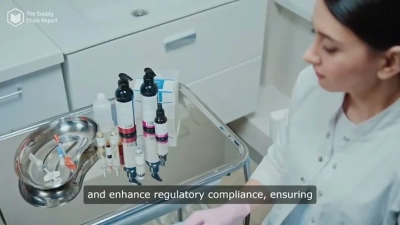In the rapidly evolving pharmaceutical landscape, the rise of innovative active pharmaceutical ingredient (API) products is redefining the dynamics of global supply chains. According to recent industry reports, the global API market is projected to reach $211 billion by 2024, growing at a compound annual growth rate (CAGR) of 6.5%. This significant growth is driven by the increasing demand for cost-effective and high-quality medicinal products, highlighting the crucial role that API pharma products play in pharmaceutical manufacturing and distribution. As companies strive to improve efficiency and reduce costs, integrating innovative API solutions has become essential for staying competitive in a market characterized by stringent regulatory standards and rising consumer expectations.
The transformation brought about by these innovative API pharma products extends beyond mere production efficiencies; it encompasses the entire supply chain from raw material sourcing to distribution. A comprehensive analysis from a leading market research firm notes that enhancements in API processing technologies and a shift towards digital supply chain management are vital for improving transparency and traceability in the market. As stakeholders increasingly prioritize sustainability and compliance, the adoption of cutting-edge API pharma products is emerging as a strategic imperative that not only meets regulatory requirements but also sets the foundation for resilient, agile, and responsive supply chains globally.

The pharmaceutical industry is undergoing a significant transformation, particularly in the area of active pharmaceutical ingredients (APIs). Emerging trends in API innovations are not only enhancing the effectiveness of drug development but are also reshaping global supply chains. One of the most noteworthy trends is the shift towards increased automation and digitalization in API production. Manufacturers are leveraging advanced technologies like artificial intelligence and machine learning to optimize production processes, ensuring higher quality and faster delivery of APIs to markets around the world.
Another critical trend is the growing focus on sustainability within the API sector. As global regulations tighten around environmental impacts, pharmaceutical companies are investing in greener manufacturing processes. This includes the development of APIs using renewable resources and reducing waste throughout the supply chain. The integration of circular economy principles is also becoming prevalent, as firms strive to minimize their ecological footprint while maintaining efficiency in their supply networks.
Moreover, collaboration and strategic partnerships are emerging as pivotal elements in enhancing supply chain resilience. Pharmaceutical companies are increasingly working together with suppliers and logistics providers to create more agile and responsive supply chains. This shift allows for rapid adaptation to market changes and disruptions, ensuring that essential medications reach those in need without delay. As these innovations continue to evolve, they will undoubtedly play a crucial role in shaping the future landscape of global pharmaceutical supply chains.

In recent years, the pharmaceutical industry has faced increasing pressure to enhance the traceability and security of Active Pharmaceutical Ingredients (APIs). Blockchain technology has emerged as a game-changer, offering unprecedented solutions to these long-standing challenges. By creating a decentralized and immutable ledger, blockchain enables all stakeholders in the supply chain—manufacturers, distributors, pharmacies, and regulators—to track the journey of APIs from their source to the final consumer. This transparency not only mitigates the risk of counterfeit drugs but also fosters trust among all parties involved.
The use of blockchain in API management elevates the standard of compliance and security. Each transaction is recorded with a unique cryptographic signature, ensuring that any alteration is immediately detectable. This level of traceability allows for rapid identification of issues, such as product recalls, which can be executed with far greater efficiency. As a result, companies can respond to safety concerns in real time, safeguarding public health while maintaining regulatory adherence.
Moreover, the integration of smart contracts within blockchain technology automates various functions, from order processing to payment settlements. This automation reduces the likelihood of human error and streamlines operations, ultimately decreasing costs and improving delivery times. As the pharmaceutical sector continues to evolve, the adoption of blockchain for API traceability will not only enhance security but also transform global supply chains into more resilient and efficient networks, paving the way for innovation in drug development and distribution.
This chart illustrates the significant improvement in API traceability before and after the implementation of blockchain technology, reflecting a move from a score of 60 to 95 out of 100, highlighting the transformative impact of innovative solutions in pharmaceutical supply chains.
In the rapidly evolving landscape of the pharmaceutical industry, real-time data analytics is becoming a cornerstone for enhancing the efficiency of active pharmaceutical ingredient (API) supply chains. As highlighted in recent reports, over 50% of businesses globally are now influenced by digitalization, which has prompted a significant shift towards the adoption of data-driven strategies. By leveraging real-time analytics, pharmaceutical companies can achieve greater visibility throughout their supply chains, enabling them to respond swiftly to market demands and ensure product availability.
The integration of advanced data analytics tools allows manufacturers to monitor supplier performance, track inventory levels, and forecast demand accurately. According to industry data, those who implement real-time analytics can reduce their supply chain costs by approximately 15-20%. This efficiency not only minimizes wastage but also enhances delivery timelines, contributing to overall customer satisfaction.
Moreover, the combination of data analytics with emerging technologies like AI and blockchain can further streamline operations. For instance, AI can help identify patterns in data, leading to better decision-making processes, while blockchain technology provides a secure and transparent framework for tracking the journey of APIs from manufacturers to patients. This transformation indicates a future where data not only drives efficiency but also builds trust in the pharmaceutical supply chain.
In today's rapidly evolving pharmaceutical industry, the push for sustainability has become more pronounced, particularly in the production of Active Pharmaceutical Ingredients (APIs). Eco-friendly practices are no longer optional; they are essential for fostering a more sustainable global supply chain. Companies are now challenged to rethink their manufacturing processes, opting for greener alternatives that minimize carbon footprints and reduce waste.
One innovative approach being adopted is the integration of biotechnological methods. By harnessing the power of microorganisms, manufacturers can produce APIs in a more environmentally friendly manner. This not only reduces the need for harmful solvents and chemicals but also enhances the efficiency of production processes. Furthermore, advancements in green chemistry are encouraging the development of processes that use renewable resources and generate less hazardous waste, exemplifying a significant shift towards eco-conscious practices.
Additionally, the pharmaceutical industry is increasingly prioritizing sustainable sourcing. Companies are seeking suppliers who adhere to sustainable practices, while also focusing on transparency throughout the supply chain. This commitment not only boosts brand reputation but also aligns with consumer demands for ethically produced products. As globalization continues to shape the market, embracing sustainability in API production is crucial for companies aiming to lead in innovation while contributing positively to the planet.

The pharmaceutical industry is undergoing a significant transformation, driven by disruptive Active Pharmaceutical Ingredient (API) solutions that are reshaping traditional distribution models. According to a report by Grand View Research, the global API market was valued at approximately $177.6 billion in 2021, with an anticipated compound annual growth rate (CAGR) of 6.9% from 2022 to 2030. This growth is being propelled by innovative technologies that enhance the integrity and efficiency of supply chains, ultimately leading to improved patient outcomes.
Case studies reveal how companies like Novartis and Teva Pharmaceuticals have implemented advanced analytics and blockchain technology to optimize their API sourcing and distribution channels. By leveraging these tools, they have significantly reduced lead times and improved traceability—a critical factor in ensuring compliance with global regulations. For instance, a study published in the Journal of Pharmaceutical Sciences highlighted that companies employing AI-driven predictive analytics have achieved a reduction in inventory costs by up to 25%, leading to marked efficiencies in their distribution models.
Moreover, the rise of virtual manufacturing processes stands out as a game-changer in the API landscape. With the global API supply chain historically vulnerable to disruptions, the COVID-19 pandemic illuminated the risks associated with relying heavily on single geographic sources. Companies that adopted decentralized production strategies not only mitigated these risks but also enhanced their capacity to respond swiftly to market demands. A McKinsey report indicates that businesses embracing these innovative practices are likely to see a 20-30% increase in operational resilience, thereby revolutionizing how APIs are sourced and distributed across borders.


